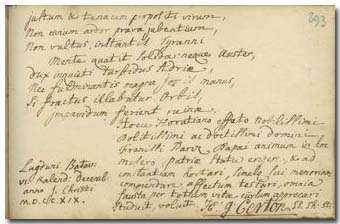
justum & tenacem propositi virum,
Non civium ardor prava jubentium,
Non vultus, instantis Tyranni
Mente quatit solida: neque auster,
dux inquieti turbidus Adriae,
Nec fulminantis magna jovis manus,
Si fractus illabatur Orbis,
impavidum ferient ruinae. *
Hocce Horatiano effato nobilissimi politissimi ac doctissimi
domini Francisci Pariz Papai animum in hoc misero patriae statu
erigere; & ad constantiam hortari, simulque sui memoriam
commendare, affectum testari, omnia fausta per totum vitae cursum
apprecari studuit, voluit. H. G. Certon, SS. Th. St:
Lugduni Batav[orum] VI. Kalend: decemb[ris]
anno j. Christi M.D.CC.XIX.
|
* Horace, Carmina
3.3.1-8. We have included the English translation by John
Conington. The verse is also quoted by Sámuel Fáy on
p. 475.
|
|
|
The man of firm and righteous will / No rable, clamorous for the
wrong / No tyrant's brow, whose frown may kill, / Can shake the
strength that makes him strong / Not winds that chafe the sea they
sway / Nor Jove's right hand, with lightning red: / Should
Nature's pillar'd frame give way, / That wreck would strike one
fearless head. *
With these Horatian verses I want to elevate
the soul of the learned and erudite Ferenc Pápai Páriz in the
middle of the present tribulations of his fatherland, and to
encourage him to endurance; and at the same time to recommend
myself into his memory, to give a token of my affections, and to
wish him all kind of happiness during all his life. H. G. Certon,
student of theology
In Leiden, in the year 1719 of Jesus Christ, on
the 6th day before the calends of December
|
p. 393. Leiden, November 26, 1719
Certon, Henri Gabriel
(1697-1754), Vallon pastor in the
Netherlands
Henri Gabriel Certon was born in Dordrecht on February 20, 1697,
the son of the French emigrants Henry Louis Certon and Marianne de Marchezalliers de Bellevue.
He studied theology in Leiden, and from 1725 he was a Vallon
preacher in Dordrecht. He retired in 1753, and died in Dordrecht
on May 28, 1754. His sermons were published in 1803 in three
volumes. He married Marie Langlois, and they educated two sons and
two daughters. A son of theirs, Henry Abraham (1735-1808) was the
Vallon pastor in Rotterdam.
This Horatian quotation and the recommendation of
Henri Gabriel Certon belong to the most direct allusions to the
situation of Transylvania in the album. These same Horatian verses
were quoted also by Sámuel Fáy in Vienna in 1726 (p.
475).
•
NNBW VII 291 |

